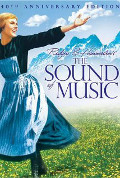
Directed by
Robert Wise
174 minutes
Rated G
Reviewed by
Bernard Hemingway

The Sound Of Music
Julie Andrews, as ever, an outstanding performer, plays Maria, a young woman in a nunnery in the Austrian mountains who is having trouble reconciling herself to the discipline of a convent. So what does her Mother Superior (who evidently saw Maria a year earlier working her nanny magic in Mary Poppins) suggest but that she take a stint as a governess to widowed Captain von Trapp (Christopher Plummer) and his seven kids.
This overlong and unrelentingly saccharine treatment of the Howard Lindsay and Russel Crouse stage play swept the Oscars (including Best Picture and Director) and became a huge popular success, a status which it has largely retained to this day.
Shot in Todd-AO with wonderful scenery and sumptuous interiors in moral sensibility it is very early 1960s (which really means 1950s) and the transposition of American middle-class ideals to 1930s Austria on the eve of Hitler's Anschluss is rather unconvincing, as are many of the stage sets. Notwithstanding, there's a clutch of much-loved songs by Rodgers and Hammerstein, including 'My Favourite Things', 'Do-Re-Mi', 'Eidelweiss' and of course the title song which opens this film in Wise's classic staging of it, the camera swooping in on Andrews in a lush green meadow.
Although one can see that there was a need to explain what happened to the von Trapps after the main story is resolved given the Captain's anti-Nazi politics, once the romance between he and Maria is duly resolved the rest of the film is perfunctory and the final twenty minutes, in which the family flee the Nazis, are a slog.
FYI: Marni Nixon, a classically trained soprano who dubbed the singing voices of many of Hollywood's leading ladies including Deborah Kerr, Audrey Hepburn and Natalie Wood, plays Sister Sophia, one of the nuns who appears in the song 'Maria'.
Want something different?





